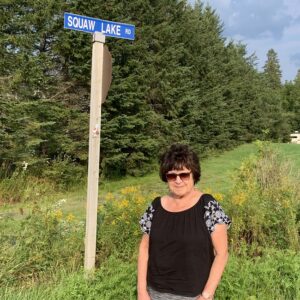Optimistic outlook as rural township looks to rename derogatory road sign

By Kelly Anne Smith
NIPISSING FIRST NATION – Nibi Kwe Lane is still the first choice for renaming Squaw Lake Road for Joanne Morrison and her former students.
Now there is a good possibility that Nibi Kwe Lane will be chosen to replace the derogatory s-word.
As the instructor of the Native Identity Development course that is part of the Anishinabek Educational Institute (AEI) Native Community Worker Program, she encouraged students to ask the Township of McKellar to change the name of a road with the historically offensive name. Morrison does not say the current name aloud.
On Feb.13, 2020, Natasha Ward wrote on behalf of the class asking that the Township of McKellar considers Nibi Kwe Lane as the new name. In the letter, Ward says, “The reason for the request is our class is looking to create change to honour First Nation communities and restore Native identity throughout Ontario.”
Morrison explains why students chose Nibi Kwe Lane.
“I think that with them (the township) knowing a little bit more about the history, and that name being there for so long, I think if they did choose to use an Indigenous name, it would be giving that honour back. It should be Nibi Kwe Lane. Understanding that nibi is water which is lake and kwe is woman. It’s giving that honour back to where that word took it away.”
When the Township first asked homeowners about changing the name, there wasn’t much interest. But in 2021, with the remains of many Indigenous children found at former Indian Residential School sites, the mayor and council moved to change the roadway name as an action for Truth and Reconciliation.
Township of McKellar acting Clerk Ina Watkinson says the renaming is scheduled for the Dec. 14 Agenda of Regular Council.
“We have received the surveys back from the majority of the property owners on the road. The decision to be made by Council is between Swan Boulevard and Nibi Kwe Lane.”
This past August, Morrison took her mother Mary Dolbeck, both of Kebaowek First Nation, to the Township to see the sign for themselves.
“It was something that she inspired me by, how that word made her feel, to make that change. And I wanted her to see that sign and know that it will be taken down and changed.”
Dolbeck had a strong reaction to the sign.
“It’s kind of like awe, like a shock, to see that in our own country. That that could be there,” she expresses. “I’m hoping that it was done without the knowledge of what that word means to people. Perhaps they didn’t quite understand what it means and that it’s a derogatory word.”
Dolbeck is proud of her daughter for being the impetus of change.
“I think she felt really honoured that I did this because I knew how it made her feel that she was my inspiration. My Mom, she knows how much I love her and respect her. I’ve heard her stories and her experiences. She’s taught me to be proud of my own self-identity. And to never feel ashamed as she was made to feel as an Indigenous woman.”
Reflecting on the original class assignment, Morrison says it was a learning opportunity.
“You have to find that meaning behind what you are teaching to inspire students. A lot of our courses are related to empowerment, our culture and making change. The best way to gain that empowerment is by experiencing it. And experiencing that you have the power to make change. And that these things really matter.”
“When you give them those tools, to make that change, and when they feel that empowerment, it will encourage them further on in their life to continue that. And they know they have a voice. And it’s important that we use our voices, because as Indigenous people, for so long we’ve been shut down.”
Morrison adds that sometimes it’s been easy for a lot of Canadians to turn their cheek to a lot of the history.
“Even that word is part of our history. But when the reality of the truth has come out, it has opened up a lot of Canadians eyes to how our history has affected us.”
With extensive professional experience in mental health, Morrison works for cultural healing.
“I’ve seen the direct impact of loss of Indigenous identities and the effects it has on our people which has given me a passion about how to restore it and promote self-empowerment for change.”


